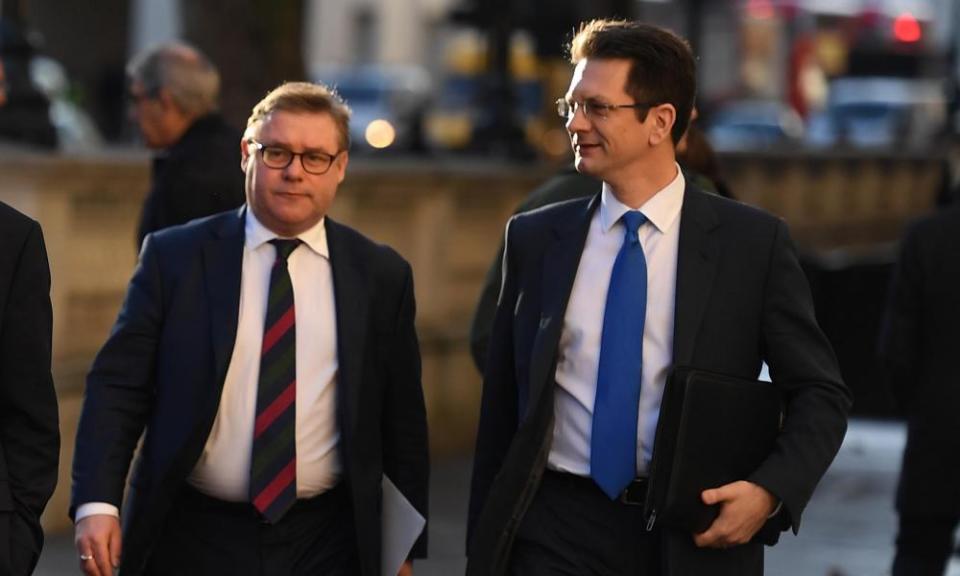'It's painful to choose': ERG locked in internal talks over Brexit deal

The 28 Eurosceptic Tory hardliners have not said “no” to Boris Johnson’s Brexit deal, giving No 10 hope that they will swing behind the prime minister.
The group, known as “the Spartans”, had indicated they would take a lead from the Democratic Unionist party, which categorically said it would vote against Johnson’s deal. But several of the Tory hardliners – from Peter Bone to Andrew Bridgen – suggested they were likely to vote for the agreement.
It was not unanimous, however, as the European Research Group’s steering committee, made up of senior MPs and former ministers, met on Thursday for a “deep discussion” about the new agreement, which they went through line by line.
“There were a lot of mixed views. This vote will cause some agony for some members, but it will be up to each member’s conscience,” said a source.
Particular sticking points included the role of the European courts of justice in solving disputes – “Why can’t it be the supreme court?” said one member – and the failure to give the DUP a veto.
“We have stood with the DUP for so long that for some members it will be painful to choose,” said another.
But even some of the most fervent Brexiters, including Steve Baker and Mark Francois, made positive noises about the settlement, saying there were “limited remaining concerns”. Owen Paterson, the former Northern Ireland secretary and another hardliner, also did not rule out backing it.
Another hard Brexiter, Sir Bernard Jenkin, said: “It looks very much better than [Theresa] May’s deal, but I am going to read the details very carefully before deciding.”
The ERG will hold an emergency meeting on Saturday morning before going to the chamber for the vote.
With many of them considering backing the deal, there were signs of discontent on the other wing of the Tory party, among former remainers and softer Brexiters. Oliver Letwin, a former Conservative who lost the whip, said he would be voting for the “admirable” deal, but also signed a letter, along with David Gauke, the former justice secretary, demanding to see an impact assessment first.
Some of the other former Conservatives who lost the whip were anxious not to be rushed into voting for a hard deal without proper scrutiny. There were also worries that voting for a deal could open the door to the Eurosceptics backing out at a later date, when the withdrawal agreement returns for a second reading, to cause a no-deal crash-out on 31 October. To mitigate the risk of this, there was talk on Thursday night of a cross-party amendment to force Johnson into a Brexit extension if the withdrawal agreement bill was voted down at a later stage in order to wreck it.
At the same time, a number of pro-deal opposition MPs were agonising over whether to vote for the deal. Special advisers were tasked with contacting key Labour MPs on Thursday. Johnson himself is expected to begin calling round wavering ERG MPs and Labour MPs with large leave votes on Friday, Downing Street sources said.
Labour MPs were coming under huge pressure from colleagues not to back a Johnson-led deal, but Ruth Smeeth, MP for Stoke-on-Trent North, said: “I’ve been quite clear publicly since April, I want to vote for a deal. It is my intention to vote for a deal unless [Johnson] has completely undermined workers’ rights, environmental rights and consumer rights.”
But there was silence from many of the other pro-deal opposition MPs, including those who signed a letter telling the EU they wanted to vote for an agreement, such as Stephen Kinnock and Sarah Champion.
One MP said: “Whatever I say I will probably be met with a shower of abuse from one side or the other. I’m still undecided whether to support the deal, which in many ways is less attractive than Theresa May’s deal, but I have to think of the counterfactual, which is dangerous and risky.”
Jim Fitzpatrick, the Labour MP for Limehouse and Poplar, said he voted for May’s deal and he would do the same with Johnson’s agreement, but he said many of his colleagues had not decided. He said up to 20 Labour MPs could back a deal but said the fact it was Johnson made it harder to vote for than an agreement put forward by May.
The only firm Labour switcher was Ronnie Campbell, who previously abstained. He told talkRADIO: “Somewhere along the line, MPs have got to say, ‘Enough’s enough.’ Let’s go for the deal, let’s do it.”

 Yahoo News
Yahoo News 